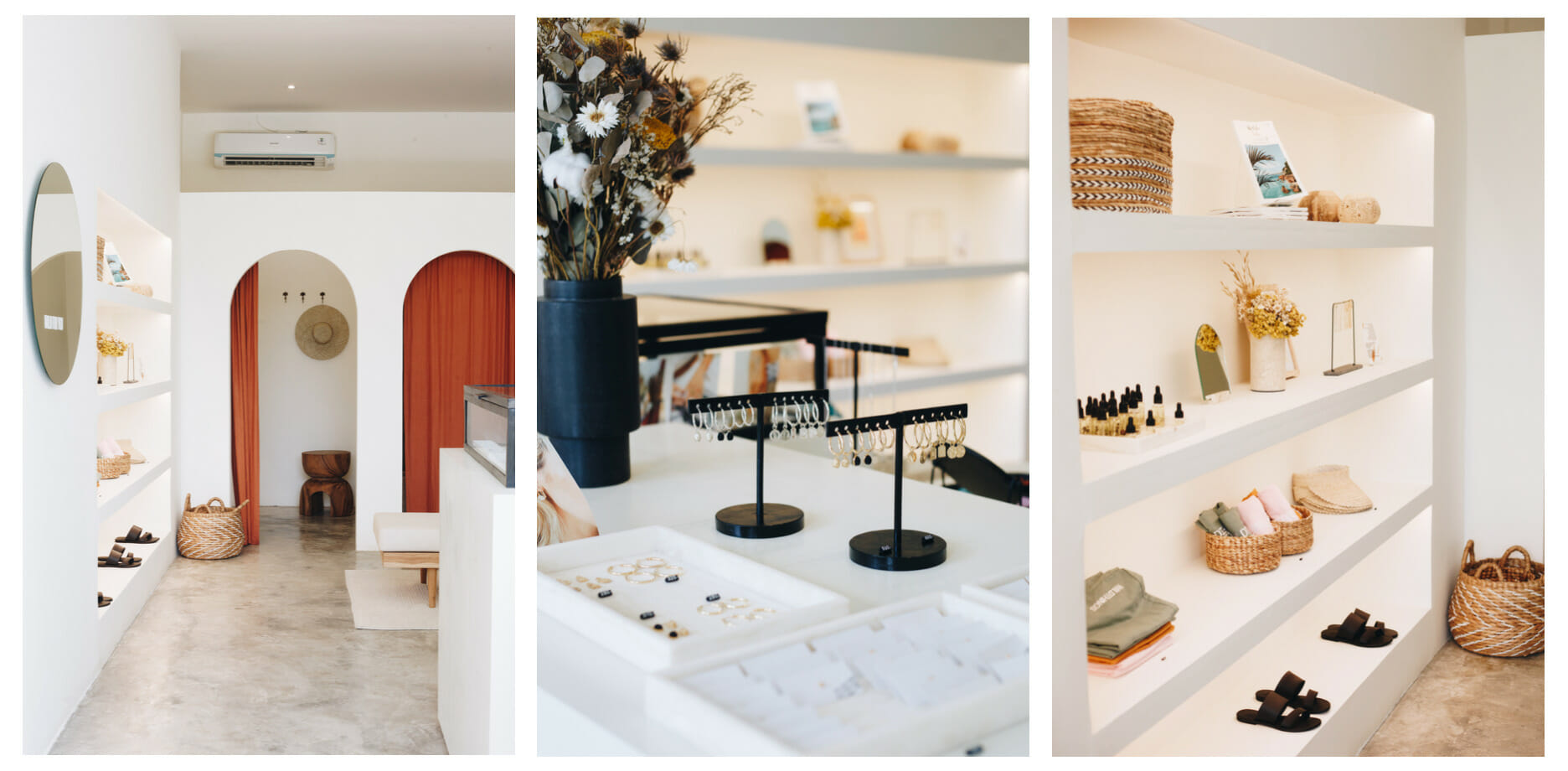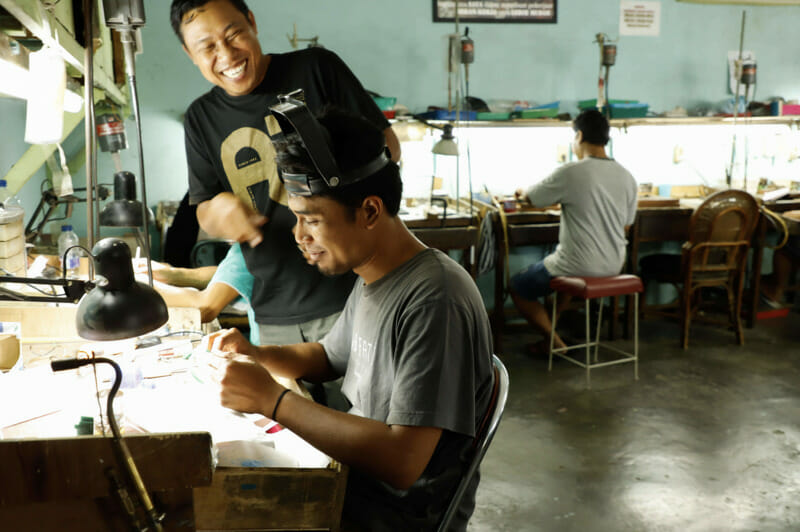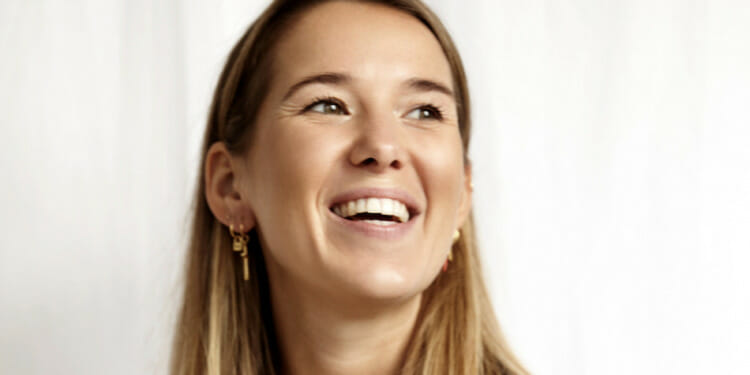Leanne Jacommetti founded Wildthings Collectables in 2016 inspired by her Indonesian roots and love for Bali. Designed in Amsterdam and made by local Balinese artisans, Leanne’s jewelry reflects her respect and admiration for different forms of craftsmanship encountered throughout her many travels. We spoke to her about the value of working with good employers and the importance of giving back to the communities who have helped her along the way.
Wildthings is inspired by your Indonesian roots and your love for Bali. What particular aspects of Balinese culture do you feel an affinity for and how is this reflected in your designs?
As a child, I was privileged enough to travel a lot with my parents. We went to South America and Asia, to many different countries where I think there’s a real appreciation for handicrafts and artisanal handmade products. When I traveled to Indonesia I got in touch with all kinds of craftsmen, from woodworkers to jewelry makers, these skills are often passed on from generation to generation. Today, so much production happens in factories with machinery, so I wanted to find a way to preserve these skills and crafts that are not only a big part of these countries’ cultures, but a major source of livelihood for many people.
I met a family in Bali who helped make my ideas come to life in those first few years of my business. Aside from the amazing craftsmanship, I really feel at home in Indonesia. Their culture is beautiful and I love how Bali is an island of different religions. It’s just a place that’s warm and welcoming, and my brand is a way to support the local communities there, by providing work for them.

Why did you choose to name your brand Wildthings Collectables?
When I started in 2016, minimalism was a big trend in jewelry, so I wanted to do something more outspoken, edgy and sexy. My dream for the brand has always been for it to be a place that brings together handmade goods and products from my travels abroad to different countries.
Sustainability is a central pillar of your brand. Can you tell us about your approach to sustainability, in terms of the materials you work with, how you source them, and the communities you work with?
The core of our brand has always been about sustainability – we started that way, rather than introducing it to our production processes. Starting with our suppliers, we looked at the way they treat their employees, how they source their materials and how they dispose of their waste. We found a partner who is very progressive and forward-thinking across all aspects of production – they recycle printed paper and make sure all the waste is disposed of properly.
It feels a bit like a family where we produce, the people have worked there for a long time and they get a lot of opportunities to further their schooling and get daycare provided for their children. I often visit the place and feel that I have a very good relationship with our producers.
If there’s an opportunity to use more recycled material, we will use it, or if we can source something from somewhere with better certifications, we do. Our silver is 100 percent recycled, we use 60 percent recycled brass, and recycled glass for beads. If we have products that didn’t sell or are broken we make sure they go back to the production facility to get melted and reused, so there’s not a whole lot of waste.
We also have collections that support specific programs and initiatives for communities in Indonesia and outside. For example, we had an ocean collection that supported coral gardeners in Australia. Now we have a collection called Smile For Bali where a part of the profits go to a charity that has been giving out food during Covid when many people lost their jobs. So on both sides, we try to contribute – by working with good employers and also giving part of our profits back to the islands.
There is still a lot that we would like to improve. We’re working on a road map for the next five years to become climate neutral because our products are flown from Bali to Holland so we’re thinking about how we can compensate for that and make it more sustainable. We are also trying to educate our customers about how much effort goes into making a piece of jewelry so that they don’t think it’s so easy to just send it back. We see it as a learning opportunity for our customers, so we write blogs about it on our website and use our social media to share information about what goes into our products.
Were there any materials you really wanted to work with but decided not to because they weren’t sustainable or didn’t align well with your vision as an eco-friendly brand?
There are a lot of materials that are off-limits to us, but I wouldn’t want to use them anyway, endangered species like coral, for example. We try to mimic a lot of materials with resin made from beeswax, like ivory or coral. Our gold is certified, but it’s not 100 percent recycled, so that’s something that we’re working on and I hope we get there.
With the adoption of the UN 2030 Agenda and the 17 Sustainable Development Goals in 2015, sustainability is an essential guiding principle for businesses everywhere. A lot of brands are hopping onto the sustainability bandwagon, but it is a learning process. What were some of the key learnings from your own path to sustainability and what are some of the future challenges you anticipate for your brand?
As sustainability becomes more trendy, a lot of big retailers ask us for certifications, which we are very happy to provide, but these same retailers also offer free shipping and returns, which is against our policy because we think that’s not sustainable. They demand certain things from you but then don’t comply with your idea of sustainability. Everyone has a different standard for sustainability, some are doing a great job, some are less genuine about it, so it’s easy to clash on different understandings of what sustainability means.
There are situations where we also don’t have much of a choice when it comes to using certain materials. We still use plastic to wrap our jewelry because it’s the only way to keep the pieces from oxidizing. It’s a struggle that we have to look further into, but unfortunately, it’s not easily solved. We’re also trying to figure out how to offset our carbon footprint, and constantly trying to improve on the things that we aren’t doing well.
We learn a lot from the public on social media. People will ask us questions about the products, like if they’re vegan, and it makes us aware of certain aspects of sustainability that we then go on to research ourselves. It’s good that brands are held accountable by a knowledgeable public.

How would you like to see Wildthings Collectables evolve in the next five years?
We just launched Wildthings Studio, a digital space where we can co-create with other creatives, people who are doing something cool and combine it with our products. We just collaborated with an Indonesian artist on a range of organic t-shirts. For us it’s a nice way to work with creatives from all over the world, exploring how we can produce things in different places. It’s the new phase of our creativity, exploring other fields beyond jewelry.
We’ve been looking, for example, at Portugal; we’ve also made some things in Holland, where most of our customers are based, so local production is important. I would really love to reopen our store in Bali, which we had to close because of Covid, and hopefully open other stores around the world. I hope in five years our brand will consist of other kinds of handcrafted items, not just jewelry, from all sorts of different countries.
Editor’s Note: The opinions expressed here by Impakter.com columnists are their own, not those of Impakter.com. — In the Featured Photo: Leanne Jacommetti Featured Photo Credit: Wildthings Collectables










